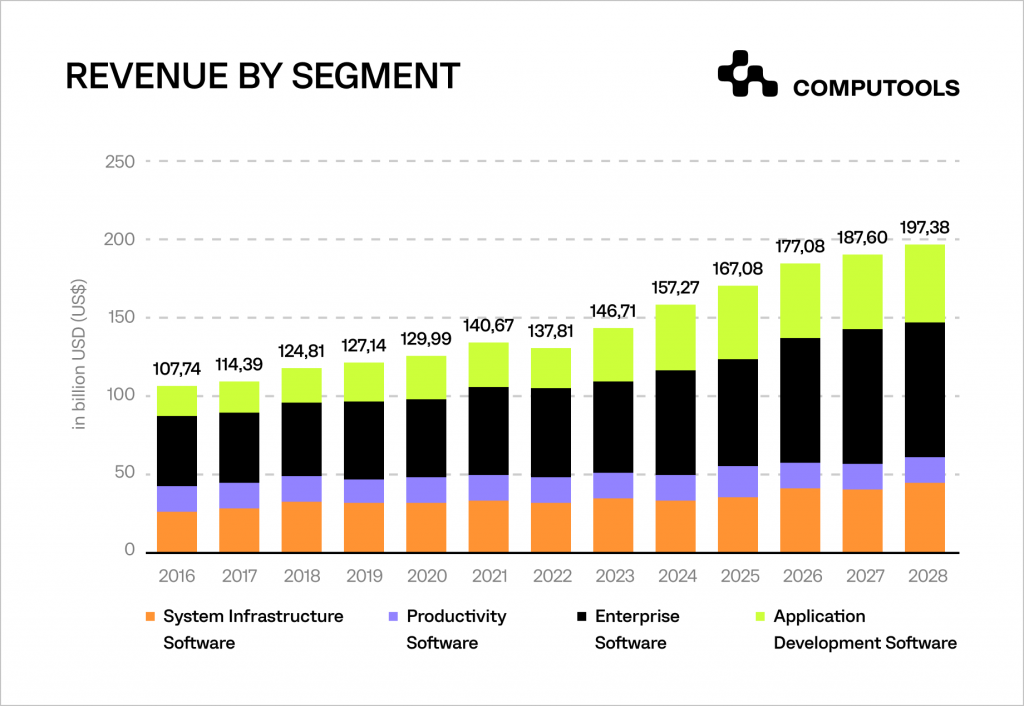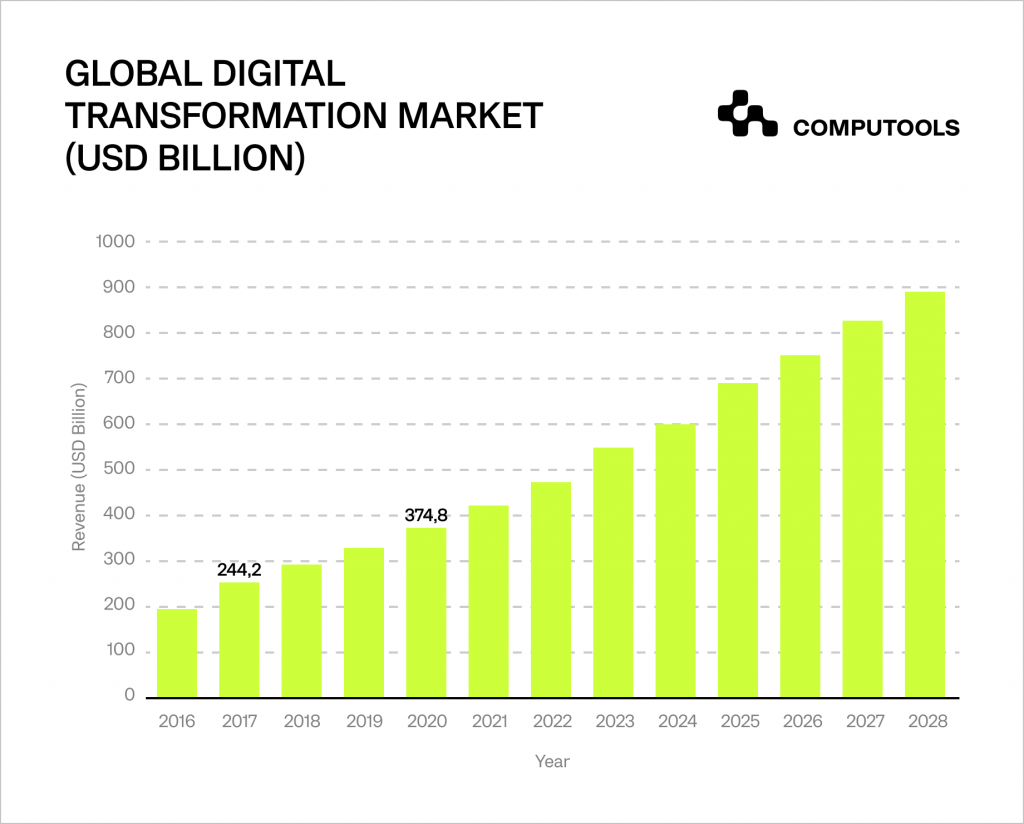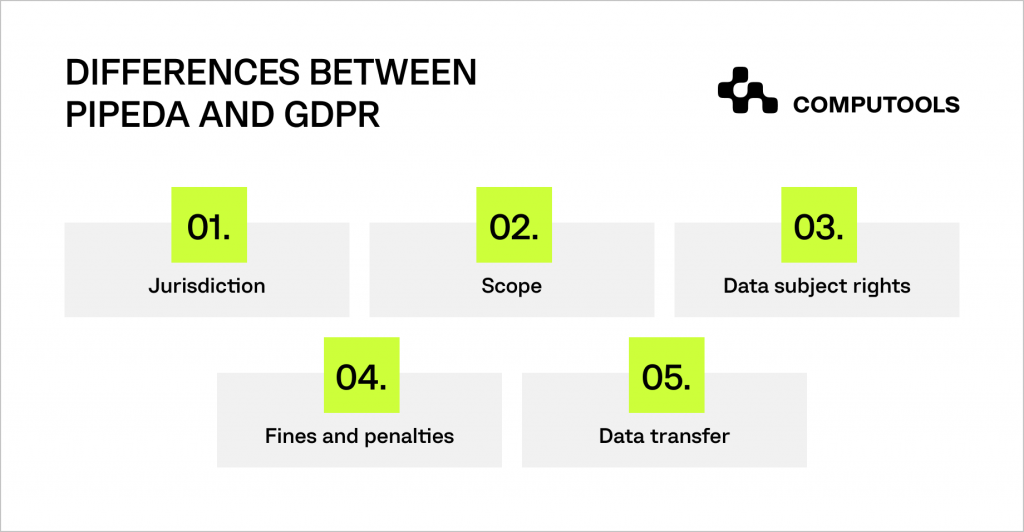Despite the traditional divisions into first, second and third-world countries, digital innovations and technological advancements have bridged the gap. Now, anyone – be it an individual, business or company – can expand and reach the global market, offering products, services and experiences for varied tastes and scales.
Globalisation trends and IT product development are breaking down barriers, emphasising the significance of sustainable growth and technological progress for businesses worldwide, regardless of their location on the map.
In today’s global business landscape, where competition knows no boundaries, businesses increasingly adopt innovative technologies and digital strategies to gain a competitive edge. Canadian and European regions, both renowned for their technological prowess, stand as vibrant hubs in this digital race.
What sets these regions apart, and what differences make them stand out in the technological landscape? Let’s delve into the specifics, beginning with some statistics.
According to Statista’s research, in 2023 the European Software market is expected to reach about US$146.70 billion. And this growth is likely to continue at a steady pace of 6.12% each year from 2023 to 2028.

Similarly, the Canadian ICT sector continues to make significant progress, outpacing the overall Canadian economy in output, employment and innovation growth. Specifically, application development software in Canada is expected to reach US$5.33 billion by the end of 2023.
These impressive numbers keep showing us how digital transformation and product development growth are happening all around the globe. And it’s not a surprise – a PwC survey found that 60% of executives worldwide think digital transformation is the most important factor for their business growth, making the realm of digital transformation a highly profitable market, currently reaching almost US$500 billion.

However, working in different parts of the world and maintaining numerous business processes is always accompanied by a unique set of challenges and problems specific to each country. The development of IT products for different regions requires careful analysis and a deep understanding of the peculiarities of each market.
My professional experience allows me to compare the processes and requirements when developing IT products for the European and Canadian markets. Over my four years in the professional field, I’ve had a unique opportunity to work with clients from diverse cultures and participate in projects involving mobile applications and website development.
The experience of gaining knowledge and skills in various aspects of software development services allows me to make a significant contribution to analysing the similarities and differences between European and Canadian markets.
Working with European clients has shown me the paramount significance of cultural adaptation in diverse digital products. Similarly, engaging with IT teams from myriad countries and regions underscores the global disparities in requirements and expectations. This encompasses product localisation, meticulous attention to language aspects, and adherence to regulations like GDPR.
My expertise in mobile applications, custom software development and websites extends to tailoring design and functionality to align with cultural peculiarities and language requirements. Within this article, we will explore the crucial factors and distinctions that demand careful consideration.
Want to learn more about the requirements of a specific market?
Contact us →Regulatory Requirements
European and Canadian markets have different laws and rules that govern the development and use of IT products. In Europe, there’s the General Data Protection Regulation (GDPR), which makes it mandatory for companies to follow strict rules about data protection and transparency in handling data.
In turn, in Canada, there are similar requirements outlined in the Personal Information Protection and Electronic Documents Act (PIPEDA). The differences in these regulatory requirements include data transfer, jurisdiction, data subject rights and others that can significantly impact how data is collected, stored and processed in IT products.
Different countries and regions may also have varying security standards for IT products. They might require adherence to specific standards, such as ISO 27001 which is now recognised worldwide.

Cultural Aspects
Cultural nuances play a major part in shaping the design, interface and functionality of IT products within a specific region. In the context of the European market, developers face the challenge of accommodating a multitude of languages and diverse cultural backgrounds. This requires product localisation and adaptation to meet the unique preferences and expectations of various European users.
In the case of the Canadian market, bilingualism is a key consideration due to the country’s official languages, English and French. Moreover, developers must be attuned to the cultural specifics of local communities, ensuring that IT products resonate effectively within this culturally diverse landscape.
By embracing these cultural factors, developers can create products that not only function seamlessly but also resonate deeply with users, fostering enhanced user experiences and market penetration.
Language Localisation
The European market is known for its multilingualism, making language localisation an integral part of the development process. Supporting multiple languages and cultural nuances may require significant efforts and resources.
Market Specifics
Each market has its distinct features and requirements. Thorough market research is important to comprehend the specific products and features sought after in each region. For example, in Canada, there’s a notable interest in healthcare and well-being products, while in Europe, the emphasis often lies on nature-related and ecological projects. Understanding these preferences is vital for successful product development and market penetration.
Let’s explore the development of a mobile app for a healthy lifestyle, such as a fitness application enabling users to monitor physical activity, maintain a balanced diet and exchange experiences with others. Our development team, well-versed in working with clients from Europe and Canada, decided to customise the product for these distinct markets.
In Canada, especially in areas promoting health and an active lifestyle, we considered potential variations in users’ physical activity and dietary habits. To cater to this diversity, we introduced features enabling users to select local fitness practices and recipes. Additionally, we seamlessly integrated numerous local health and fitness-related apps and services.
In the European region, where nature and ecological concerns hold significance, our focus shifted towards outdoor activities and events. We incorporated functions allowing users to share their outdoor adventures and offer tips for outdoor activities, aligning the app with the region’s environmental ethos.
This case highlights that the development of IT products for different regional markets requires flexibility and an understanding of local nuances. Our team successfully adapted the product, taking into account cultural, linguistic, and market differences, leading to global success.
Technological Requirements
The diversity in technological platforms and infrastructure across regions is a significant factor to consider in IT product development. Recognising the technologies favoured by clients and anticipating the necessary integrations are vital aspects of this process.
To illustrate, let’s delve into the development of a mobile application for online shopping. While collaborating with European clients, we see distinct mobile device preferences across European countries. For instance, in Scandinavian nations, like Sweden and Norway, iOS devices, particularly smartphones, enjoy immense popularity.
Conversely, in Southern European countries, like Italy and Spain, Android devices are more commonly used, making them widely prevalent in the region. This variance underscores the importance of tailoring IT products to meet specific platform demands, ensuring seamless user experiences across diverse markets.
These platform preferences have a direct impact on the application development process. When targeting the European region, we had to cater to both iOS and Android platforms, ensuring functionality on both systems. Moreover, we customised payment and delivery methods to align with local preferences and payment systems prevalent in each region.
Now, while working in Canada, we face distinct technological differences. Although both Android and iOS are popular here, there are unique considerations when it comes to mobile apps for banking and financial transactions.
Many Canadian banks offer their own mobile applications to customers. Integrating with these applications demands additional efforts and adherence to security standards specific to the Canadian market, which differ from those in Europe.
This example illustrates how differences in technological infrastructure and consumer preferences significantly influence the development of IT products. It emphasises the critical importance of comprehending local peculiarities when engaging in diverse markets.
Business Models
Clients’ business preferences often differ based on location. In Canada, there’s a tendency towards outsourcing and hiring external developers, whereas in Europe, clients lean towards in-house development. These variations significantly influence our collaboration and client interactions.
Conclusion
The development of IT products for diverse regional markets requires a profound grasp of regulatory, cultural, linguistic and market-specific peculiarities. The experience with European and Canadian clients can provide you with a crucial skill: the capability to tailor products to varied market needs. Successful IT product development across different regions demands adaptability, expertise and a keen understanding of local nuances.
We should never underestimate the importance of a cultural aspect in the work, as it profoundly shapes the way people perceive and engage with the products. Understanding cultural differences allows us to create solutions that resonate deeply with users, fostering trust and loyalty.
Ready to enhance your IT projects and get professional expertise? Reach out to us at info@computools.com, and let’s explore how our development services can elevate your software solutions at any point in the world.









Computools was selected through an RFP process. They were shortlisted and selected from between 5 other suppliers. Computools has worked thoroughly and timely to solve all security issues and launch as agreed. Their expertise is impressive.